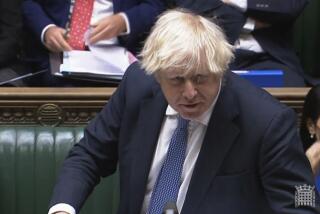Howe Departing on S. Africa Mission Many Call Futile
- Share via
LONDON — Foreign Secretary Geoffrey Howe departs today on the second leg of a South African peace mission that is given little hope of success and is seen by a majority of black leaders in and around South Africa as a futile gesture.
Howe plans to meet South African President Pieter W. Botha and Foreign Minister Roelof F. (Pik) Botha on Wednesday and is scheduled to see the president again July 29 before returning to Britain. His trip is part of an effort backed by the European Communities to promote a dialogue between blacks and whites as a way to end apartheid.
But the absence on the eve of his departure of any fixed appointments with black leaders is perhaps the best indicator of their feelings that Howe’s trip constitutes a fruitless, if not negative, exercise that has only delayed the implementation of limited European sanctions already agreed upon.
The sanctions, which Common Market leaders will consider putting into effect in September if Howe’s mission fails, include halting new investment in South Africa and a ban on selected imports.
Thatcher Opposes Curbs
Although Howe is quick to emphasize his role as an emissary of all 12 Common Market countries, he is more closely associated in the region with the exceptionally tough stand against full economic sanctions expressed by Britain’s Prime Minister Margaret Thatcher.
Black nationalist leaders in South Africa and a group of prominent figures from the Commonwealth have all demanded comprehensive sanctions as the best way to force an end to apartheid.
Under mounting pressure at home and from within the Commonwealth, Thatcher eased her anti-sanctions rhetoric last week. She suddenly discussed the possibility that some additional measures against South Africa might be required to pressure the Pretoria government into negotiations.
Although it has little obvious economic or political clout, the 49-nation Commonwealth, composed of Britain and its former colonies, has proven to be an effective pressure group.
British officials admit that unless Howe can somehow achieve meaningful progress on his present trip, pressure on the Thatcher government is likely to escalate further in the coming weeks.
Wish to Coordinate
The perceptible softening of Britain’s stance comes as the Reagan Administration undergoes a major review of its own policies toward South Africa. Officials from both U.S. and British governments have expressed a desire to coordinate their policies toward Pretoria.
After a meeting Monday with the 11 other Common Market foreign ministers in Brussels, Howe agreed that further measures against South Africa will be necessary if his mission fails to stimulate movement toward negotiations.
“There is no difficulty at all in recognizing the concern of the whole world that steps should be taken to bring apartheid to an end,” he said.
Officially, a close aide to Howe said that a “whole range of meetings with people inside South Africa” and possibly trips to the neighboring black nations will take place between Howe’s two scheduled Pretoria sessions with President Botha. But so far, he admitted, nothing is firm.
Howe was unable to arrange a meeting with senior figures of the African National Congress based in Lusaka, Zambia, during a trip to the region earlier this month, and it appears unlikely that he will be able to see Nelson Mandela, the congress leader who has been in jail for years in South Africa. Foreign Office officials have said that attempts have been made to arrange a meeting with Mandela.
Was Received Coldly
Howe got chilly receptions from Zambian President Kenneth D. Kaunda and Zimbabwe’s Prime Minister Robert Mugabe on visits to Lusaka and Harare on his first trip.
Mugabe at the time described Howe’s efforts as “reprehensible, futile and useless.”
Such strenuous opposition to Thatcher’s South Africa policy by prominent leaders of black Commonwealth nations has had an impact on the Thatcher government at home that continued to grow Monday.
As an expression of their opposition to her policies, three more nations--Sri Lanka, Cyprus and the Seychelles--announced Monday that they will boycott the Commonwealth Games scheduled to open Thursday in Edinburgh.
Their actions brought to 26 the number of nations supporting the boycott. (A 27th, Lesotho, said its athletes will not attend because they are not up to standard). The boycott stands as an embarrassing symbol of the degree to which Britain’s closest Third World friends oppose Thatcher on the sanctions issue.
Reports that Queen Elizabeth II is also upset by Thatcher’s policies assumed a greater political significance Sunday when the respected Sunday Times published a front-page story detailing what it described as “the queen’s dismay” at the course of events.
More to Read
Sign up for Essential California
The most important California stories and recommendations in your inbox every morning.
You may occasionally receive promotional content from the Los Angeles Times.













